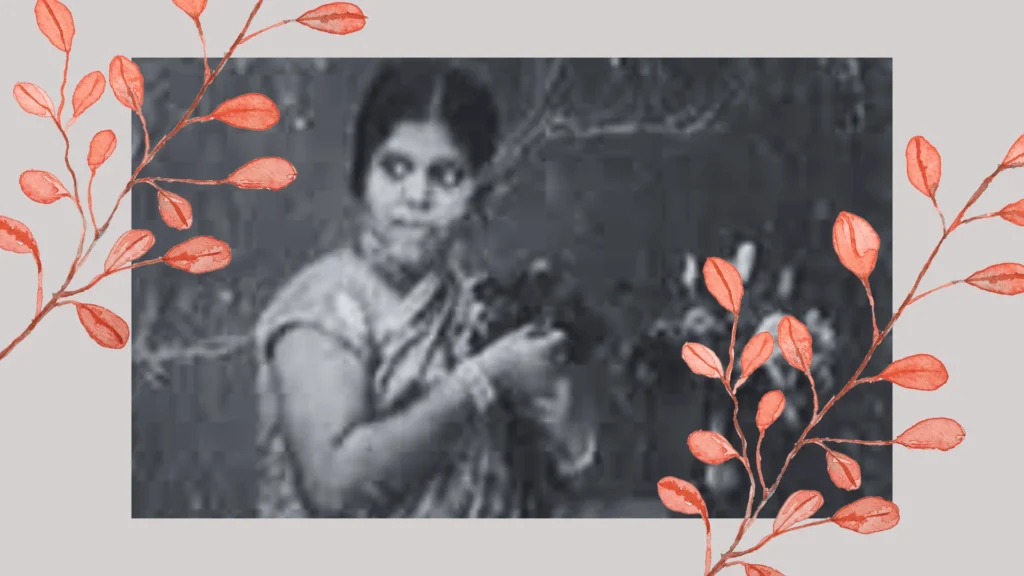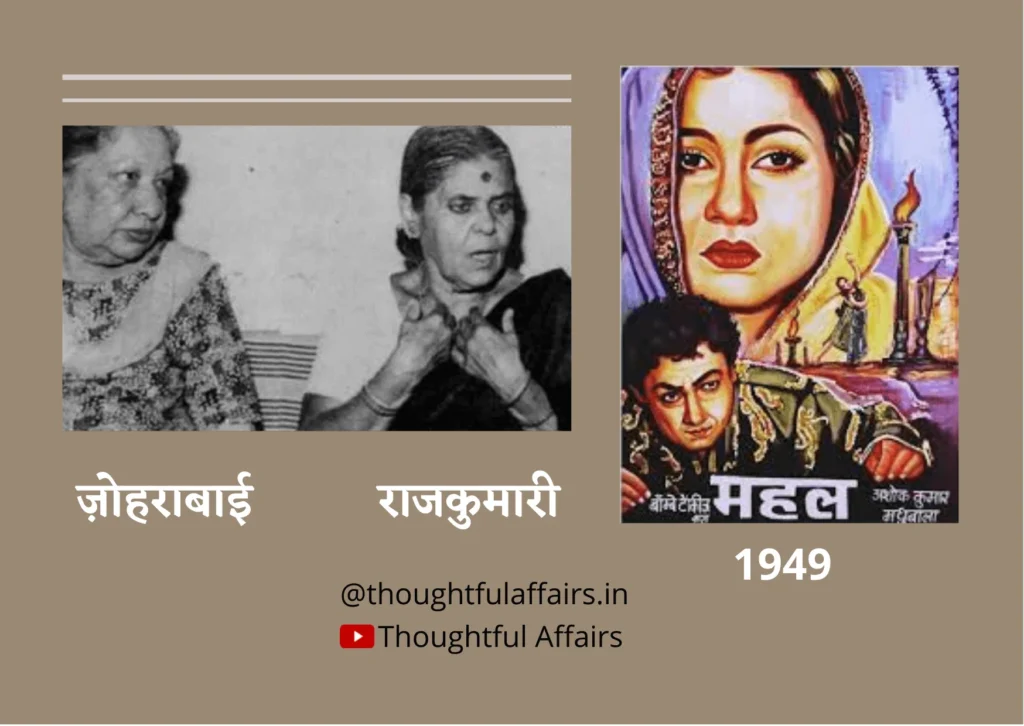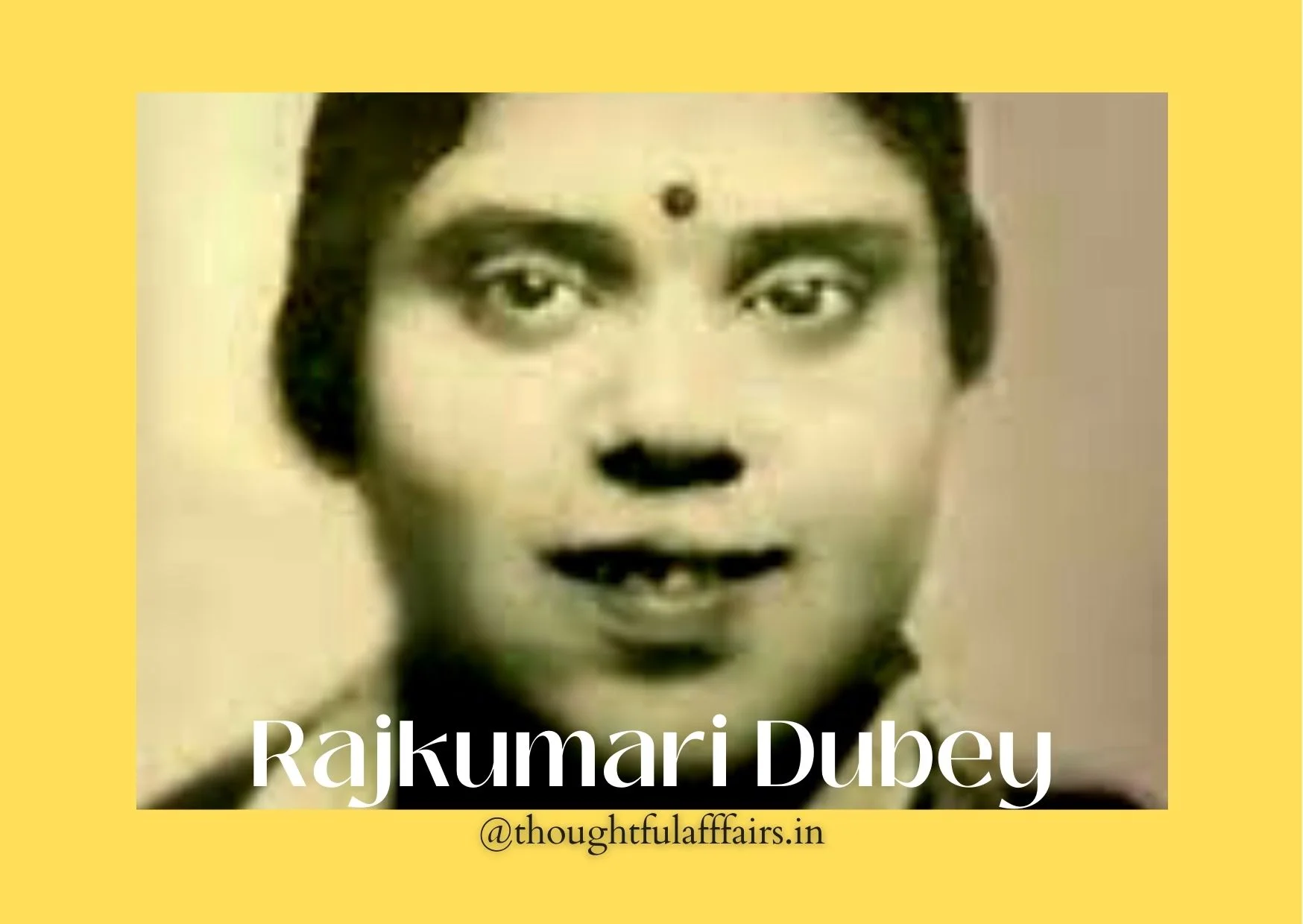राजकुमारी जो अपने उरुज के वक़्त किसी स्टार से कम नहीं थी। उनके पास काले रंग की ब्यूक कार हुआ करती थी, शोफर के होते हुए ख़ुद प्रोडूसर उनके लिए दरवाज़ा खोला करते थे। लेकिन एक वक़्त वो भी आया जब उन्हें कोरस में गाने को मजबूर होना पड़ा।
पुरानी फ़िल्मों में जब कलाकार अपने गाने ख़ुद गाते थे तो उनमें से ज़्यादातर ट्रेंड सिंगर नहीं होते थे इसीलिए म्यूजिक डायरेक्टर उनकी रेंज के हिसाब से आसान गाने बनाते थे। जब हम प्लेबैक सिंगर की बात करते हैं तो ये मान के चलते हैं कि उन्होंने तो गायन का प्रशिक्षण लिया ही होगा ! लेकिन शुरूआती दौर में कई ऐसे प्लेबैक सिंगर हुए जिन्होंने कोई ट्रैंनिंग नहीं ली थी। ऐसी ही थीं अपने समय की मशहूर पार्श्वगायिका राजकुमारी।

राजकुमारी ने उस दौर में फ़िल्मी दुनिया में क़दम रखा जब भारतीय सिनेमा में प्लेबैक तभी-तभी आया था। हर दौर का एक ट्रेंड रहता है उस दौर में गायक-गायिकाओं की आवाज़ आज के सिंगर्स की तरह नहीं होती थी। आप अगर अपने बचपन की तरफ़ मुड़कर देखेंगे तो शायद आपको याद आये कि अंताक्षरी खेलते हुए कई बार जब पुराने गानों को गाने की बारी आती थी तो उन गानों को imitate करने के लिए नेज़ल वॉइस में गाया करते थे। 30s -40s में ऐसी ही आवाज़ों का चलन था।
पर राजकुमारी की आवाज़ अपने दौर की दूसरी गायिकाओं से ज़्यादा मीठी और सॉफ्ट थी। हाँलाकि उन्होंने गायन में कोई ट्रैंनिंग नहीं ली थी, उसके बावजूद उस समय की लीडिंग रिकॉर्ड कंपनी HMV ने उन्हें बतौर सिंगर 400 रुपए महीने की तनख्वाह पर appoint किया था, और वो सिर्फ़ 10 साल की थीं जब उनका पहला गाना रिकॉर्ड हुआ था। कॉन्ट्रैक्ट के मुताबिक उन्हें साल में कोई 12 गाने रिकॉर्ड करने होते थे। वहां उन्होंने कई गुजराती गाने रिकॉर्ड किये।
राजकुमारी दुबे का जन्म 1924 में बनारस में हुआ। 8 साल की उम्र में वो बतौर बाल कलाकार काम भी कर चुकी थीं। बाद में वो स्टेज से बतौर एक्टर-सिंगर जुड़ीं। उस समय स्टेज आर्टिस्ट बिना माइक के संवाद बोलते थे और दर्शकों तक वो संवाद पहुंचें इसके लिए उन्हें लगभग चिल्लाना पड़ता था जिसका असर धीरे-धीरे आवाज़ पर पड़ता था और आवाज़ के ख़राब होने का ख़तरा बना रहता था।

राजकुमारी का फ़िल्मी सफ़र
एक बार जब राजकुमारी स्टेज पर परफॉर्म कर रही थीं तो वहां दर्शकों में “प्रकाश पिक्चर्स” के भट्ट भाई विजय भट्ट और शंकर भट्ट भी मौजूद थे। दोनों भाई राजकुमारी की आवाज़ से बहुत प्रभावित हुए और उन्हें सलाह दी कि वो स्टेज पर एक्टिंग छोड़ दें वर्ना उनकी आवाज़ ख़राब हो सकती है। इसी के बाद राजकुमारी “प्रकाश पिक्चर्स” में बतौर सिंगर-एक्टर नौकरी करने लगीं।
प्रकाश पिक्चर्स के साथ उनकी कई फ़िल्में आईं – 1934 में संसार लीला, और नई दुनिया के अलावा वो 1934 में ही आई “भक्त के भगवान” में हिरोइन के तौर पर नज़र आईं। 1935 में लाल चिट्ठी, बॉम्बे मेल, बम्बई की सेठानी, शमशीर-ए-अरब और 1936 में आज़ादवीर और स्नेहलता जैसी फ़िल्मों में वो बतौर सिंगर-एक्टर नज़र आईं। कहा जाता है कि उनका बढ़ता वज़न जब परेशानी बनने लगा तो उन्होंने एक्टिंग छोड़ने का फैसला किया और उसके बाद से सिर्फ़ सिंगिंग पर ही फ़ोकस करने लगीं।
राजकुमारी ने रतनबाला, शोभना समर्थ, गीता बाली जैसी बहुत सी हेरोइंस के लिए प्लेबैक दिया। 40s में नई दुनिया (42), स्टेशन मास्टर(42), भक्त सूरदास (42), नौकर(43), कविता(44), यतीम(45), नीलकमल(47) महल (49) जैसी कई फ़िल्मों में उनके मशहूर गाने आए। 1950 की बावरे नैन के दो गाने तो आज भी गुनगुनाये जाते हैं।
बावरे नैन – सुन बैरी बलम सच बोल रे इब्ब क्या होगा / मुझे सच सच बता दो क्याsss
फ़िल्मकार और गीतकार केदार शर्मा बहुत जल्दी किसी की प्रशंसा नहीं करते थे लेकिन वो राजकुमारी के प्रशंसक थे और उनका तारीफ़ करने का तरीक़ा भी बहुत अलग था। जब वो किसी के परफॉर्मेंस से ख़ुश होते थे तो वो उसे “दो आने” देते थे। और उन्होंने ये दो आने अपने पूरे करियर में सिर्फ़ तीन लोगों को दिए – राज कपूर, गीता बाली और राजकुमारी को।
राजकुमारी ने हिंदी के अलावा बहुत से गुजराती और पंजाबी गाने भी गाये। वो नूरजहां और के एल सहगल की बहुत बड़ी फैन थीं और इन मायनों में सौभाग्यशाली रहीं कि उन्हें दोनों के ही साथ गाने का मौक़ा मिला। नूरजहां के साथ उन्होंने “नौकर” फ़िल्म में गाया और सहगल साब के साथ “भक्त सूरदास” में। 1949 में आई “महल” बहुत महत्वपूर्ण फिल्म कही जा सकती है। इस फ़िल्म से लता मंगेशकर जैसी आवाज़ का जादू सुनने वालों के सर ऐसा चढ़ा जिसने पूरा माहौल ही बदल दिया। लेकिन इस फिल्म में राजकुमारी और ज़ोहराबाई का एक डुएट भी था जो काफ़ी मशहूर हुआ था।

फ़िल्म के निर्देशक कमाल अमरोही थे, जब ये फिल्म बन रही थी तो उन्होंने राजकुमारी से कहा कि उन्हें कोई ऐसी आवाज़ चाहिए जो लड़कों जैसी सुनाई दे। राजकुमारी ने कहा तो किसी लड़के से गवा लीजिए, उन्होंने कहा कि उन्हें कोई फीमेल वॉइस चाहिए जो लड़के की तरह गा सके। पहले राजकुमारी ने शमशाद बेगम का नाम सुझाया मगर उन्होंने मना कर दिया फिर ज़ोहराबाई अम्बालेवाली को बुलाया गया और तब ये गाना (ये रात फिर ना आएगी) रिकॉर्ड हुआ।
राजकुमारी ने काफ़ी देर से विवाह किया था। उनके पति वी के दुबे की बनारस में दुकान थी इसलिए वो मुंबई आकर बस नहीं आ सकते थे और राजकुमारी का करियर मुंबई में था इसलिए वो बनारस नहीं जा सकती थीं। काफ़ी बाद में वी के दुबे मुंबई शिफ़्ट हुए तब जाकर उनकी निजी ज़िंदगी थोड़ी पटरी पर आई लेकिन तब तक उनका करियर ढलान पर आ गया था।
50s के मध्य तक आते आते राजकुमारी को मिलने वाले गाने कम होते गए और फिर बहुत से दूसरे फनकारों की तरह राजकुमारी को भी फ़िल्मी दुनिया ने भुला दिया। लेकिन ज़िंदगी जब तक है, इंसान को जीना तो होता है और जीने के लिए पैसे की ज़रुरत भी होती है। ऐसे में उन्होंने कोरस में गाने से भी परहेज़ नहीं किया
ट्रिविया –
कुछ लोग कहते हैं कि ये पाकीज़ा के गाने की रिकॉर्डिंग की बात है लेकिन नौशाद साब ने अपने एक इंटरव्यू में बताया था कि जब वो संघर्ष के गाने “मेरे पैरों में घुंघरु बंधा दे” की रिकॉर्डिंग कर रहे थे तो उन्होंने पाँच कोरस सिंगर्स को बुलाया था। उन्होंने देखा कि चार लड़कियों के अलावा एक बुज़ुर्ग महिला वहाँ आई हुई थीं। उन्होंने अपने असिस्टेंट से उनके बारे में पूछा तो उसने कहा कि नौशाद साब आप पहचाने नहीं ये राजकुमारी जी हैं, आजकल बहुत परेशान हैं इसलिए कोरस में गाने आई हैं।
ये सुनकर नौशाद साब को झटका लगा क्योंकि वो उनके अच्छे दिनों के गवाह रह चुके थे और उन्हें बहुत admire करते रहे थे। वो पूरे सम्मान के साथ राजकुमारी को हॉल में ले गए और उनसे कहा कि आप जैसी महान गायिका कोरस में गाए ये हमारे लिए शर्म की बात है। तब राजकुमारी ने कहा कि ये तो समय समय की बात है कभी हेरोइन के लिए गाती थी आज कोरस में गा रही हूँ। भीख मांगने से तो अच्छा है। साथ ही ये भी कहा कि मैं तो कहूँगी कि जब भी आपको ज़रुरत हो मुझे कोरस में गाने के लिए बुला लिया करें।
ख़ैर ! इसके बाद नौशाद ने सबसे उनका परिचय कराया और फिर बाद में पाकीज़ा में उनसे एक गाना भी गवाया।
नजरिया की मारी – पाकीज़ा – राजकुमारी
पाकीज़ा के सभी गानों की तरह ये गाना भी बहुत मशहूर हुआ मगर उस वक़्त ऐसे कितने गाने बन रहे थे ? गानों का फ्लेवर चेंज हो गया था और राजकुमारी जैसी वरिष्ठ गायिकाओं के लिए इंडस्ट्री में कोई काम नहीं था। 1977 में लेखक-निर्देशक गुलज़ार की फिल्म “किताब” में आख़िरी बार उनका गाया एक भजन सुनाई दिया जो दीना पाठक पर फ़िल्माया गया था।
इसके बाद सालों तक फिर किसी ने राजकुमारी की ख़बर नहीं ली। 1991 में एक ब्रिटिश टीवी प्रोग्राम में वो नज़र आईं उसके बाद 1996 में वो एक अवार्ड फ़ंक्शन में दिखीं जहाँ उन्हें आशीर्वाद नवरत्न अवार्ड से नवाज़ा गया और फिर एक रियलिटी शो में दिखीं। ग़रीबी की हालत में ही साल 2000 में उनकी मौत हुई लेकिन उनकी मौत का दिन तक किसी को नहीं पता।
सही कहते हैं लोग वक़्त बदलने से पहले दुनिया बदल जाती है। आम ज़िंदगी में ऐसा होता है ये तो फिर शो बिज़नेस है। यहाँ जब तक आपका नाम है आपकी डिमांड है आप को सर आँखों पर बिठाया जायेगा और जैसे ही पर्दा गिरा आपका THE END. हाँ कुछ लोगों को ख़ुद को लाइम लाइट में बनाए रखना आता है लेकिन ज़्यादातर तो अंधेरों में ही खो जाते हैं।
इन्हें भी पढ़ें –
ख़ुर्शीद बानो
पहली “मिस इंडिया” प्रमिला
अज़ूरी – बॉलीवुड की 1st “आइटम गर्ल”
अचला सचदेव – बॉलीवुड की ओरिजिनल “ज़ोहरा जबीं”
You can also read some parts of this article in English translation
Rajkumari A Forgotten Voice
Rajkumari was no less than a star at the time of her peak. He used to have a black Buick car, the producers themselves used to open the door for him while the chauffeur was there. But there came a time when he was forced to sing in the chorus.
In the old films, when the actors used to sing their own songs, most of them were not trained singers, so the music directors used to make easy songs according to their range. When we talk about playback singers, we assume that they must have taken singing training. But in the initial phase, there were many such playback singers who did not take any training. Such was the famous playback singer of her time, Rajkumari dubey.
Rajkumari’s voice was sweeter and softer than other singers of her era. Although she had not taken any training in singing, the then leading record company HMV appointed her as a singer for a salary of 400 rupees a month, and she was only 10 years old when her first song was recorded.
Rajkumari Dubey was born in 1924 in Banaras. At the age of 8, she had also worked as a child artist. Later she joined the stage as an actor-singer. At that time, stage artists used to speak dialogues without a mic and in order for that dialogue to reach the audience, they almost had to shout, which gradually affected the voice and there was a risk of voice loss.
Rajkumari’s film journey
Once when Rajkumari was performing on stage, Bhatt brothers Vijay Bhatt and Shankar Bhatt of Prakash Pictures were also present in the audience. Both the brothers were very impressed by Rajkumari’s voice and advised her to stop acting on stage or else her voice might get bad. After this, Rajkumari started working as a singer-actor in “Prakash Pictures”.
She had several films with Prakash Pictures – Sansar Leela in 1934, and Nai Duniya, and she appeared as a heroine in “Bhakta Ke Bhagwan” in 1934. She appeared as a singer-actor in films like Lal Chitti, Bombay Mail, Bombay Ki Sethani, Shamsheer-e-Arab in 1935 and Azadveer and Snehlata in 1936. It is said that when her increasing weight started becoming a problem, she decided to quit acting and since then started focusing only on singing.
Rajkumari gave playback for many heroines like Ratanbala, Shobhana Samarth, Geeta Bali. His famous songs in many movies like Nai Duniya (42), Station Master (42), Bhakt Surdas (42), Servant (43), Kavita (44), Yatim (45), Neelkamal (47) Mahal (49) in the 40s Returns. Two songs of 1950’s Bawre Nain are sung even today.
Apart from Hindi, Rajkumari also sang many Gujarati and Punjabi songs. She was a huge fan of Noor Jahan and K L Sehgal and was fortunate in the sense that she got a chance to sing with both of them. He sang with Noor Jahan in the film “Naukar” and with Sehgal Saab in “Bhakta Surdas”. The “Mahal” which came in 1949 can be called a very important film. The magic of Lata Mangeshkar’s voice from this film touched the heads of those who heard the magic, which changed the whole atmosphere. But there was also a duet of Rajkumari and Zohrabai in this film which became quite famous.
Rajkumari had married quite late. Her husband VK Dubey had a shop in Banaras, so he could not come to Mumbai and bus and Rajkumari’s career was in Mumbai, so she could not go to Banaras. Much later, VK Dubey shifted to Mumbai, when his personal life came back on track, but by then his career had come down.
By the middle of the 50s, the songs received by Rajkumari decreased and then like many other artists, the princess was forgotten by the film world. But as long as life is there, a person has to live and money is also needed to live. In such a situation, he did not refrain from singing in the chorus.
Some people say that it is a matter of recording the song of Pakeezah but Naushad saab had told in one of his interviews that when he was recording the song of Sangharsh “Mere Pareon Mein Ghungroo Bandha De” he called five chorus singers. was. He saw that apart from four girls, an elderly lady was there. When he asked his assistant about him, he said that Naushad saab, you do not recognize Rajkumari, she is facing a bad time these days, so she is here to sing in the chorus.
Naushad Saab was shocked to hear this as he had been a witness to her good days and had been admiring her a lot. He took Rajkumari to the hall with full respect and told to her that it is a matter of shame for us that a great singer like you sang in the chorus. Then Rajkumari said that it is only a matter of time that once I used to sing for heroine, today I am singing in chorus. It is better than begging. Also said that I would say that whenever you need, invite me to sing in the chorus.
Well! After this Naushad introduced her to everyone and then later sang a song for him in Pakeezah. In 1977, for the last time in the writer-director Gulzar’s film “Kitaab”, a hymn sung by Rajkumari was heard, which was filmed on Dina Pathak.
After this, no one again took the news of the princess for years. She appeared in a British TV program in 1991, followed by an award function in 1996 where she was awarded the Ashirwad Navratna Award and then appeared in a reality show. She died in the year 2000 in the condition of poverty.
